Americans are going to the polls to elect the 45th US president. Here's what to watch out for as election night unfolds.
The 50 states and Washington DC vote across six different time zones throughout Tuesday, 8 November.
But it's not just winning the popular vote that counts. The US's complicated system is a race to secure 270 out of the 538 votes in the electoral college.
Most of the US will have to wait for polling stations to close - typically between 19:00 EST (00:00 GMT) and 20:00 EST (01:00 GMT) - for state projections.
However, one village, Dixville Notch in New Hampshire, has already cast its votes. It has a tradition of middle-of-the-night voting and declared its result shortly after midnight, before the polls had opened anywhere else.
Here's what's likely to happen, based on when polls close, with the caveat that all times are subject to change if it's too close to call.
The BBC relies on projections by its US-based partner broadcaster ABC, because it can take days for all the ballots to be counted.
As for the final result? Stay glued to your phone or TV or set your alarm for 23:00 EST (04:00 GMT). That's when West Coast polls close and history suggests a winner's declared. It was bang on the hour in 2008, and 15 minutes later in 2012.
19:00 EST (00:00 GMT)
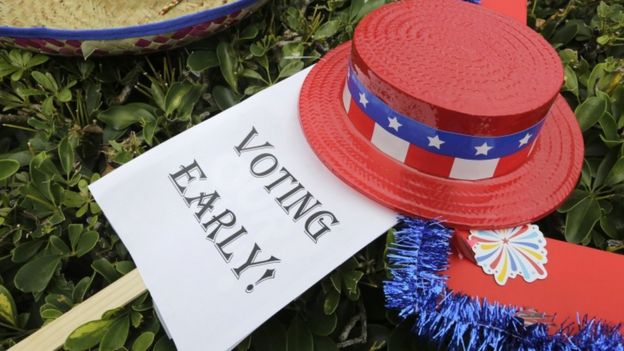 AP
AP
East Coast polling booths close and counting begins.
All eyes will be on the key battleground state of Virginia (13 electoral votes),which voted for Barack Obama in 2008 and 2012 but was previously solid Republican.
If Donald Trump is victorious here, or if it's a close win for Hillary Clinton, it could portend a very long, stressful night for the Democrats, according to the BBC's North America reporter Anthony Zurcher.
Georgia (16) is another one to watch. Republicans have carried the state since 1996 but their margin of victory have eroded in recent elections.
Also expect projections from Indiana (11), home to Trump running mate Mike Pence, Kentucky (8), South Carolina (9) and Vermont (3).
19:30 EST (00:30 GMT)
Polls close in two further important states, North Carolina (15) and Ohio (18).
North Carolina defines the American divide.
"It's seen an influx of newcomers. Many of them lean Democrat. But poor white voters tip North Carolina's rural areas towards Donald Trump," says the BBC's Katty Kay. The state could be an early indicator of which way the election is going to go.
Ohio is one of the most hotly expected results. The bellwether swing state has backed the winner at every presidential contest except one since World War Two.
We could also see a projection for West Virginia (5), which has voted Republican since 2000.
20:00 EST (01:00 GMT)
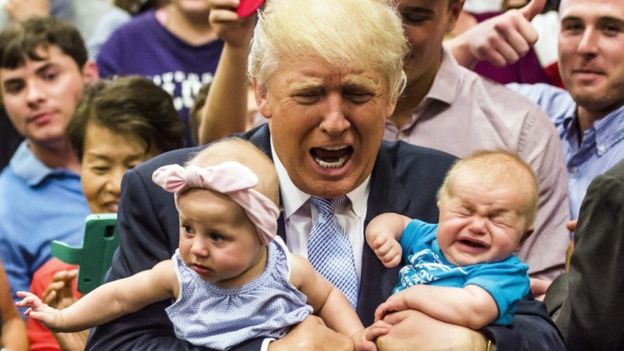 AP
AP
Rush hour begins.
Maine (4), Maryland (10), Massachusetts (11), New Jersey (14), Rhode Island(4), Delaware (3), Connecticut (7) and the District of Columbia (3) are among the East Coast states that will be projected.
The key battleground of Florida (29), which is crucial to the fortunes of any presidential contender, could also come in. The state voted for Obama in 2008 and 2012, but George W Bush won it in preceding elections - by just 537 votes in 2000. However, that year it took 36 days for Bush to be certified as the winner, as the vote triggered a recount and legal showdown, so if it's close don't expect an announcement for a while.
If Trump does not win Florida and Ohio, his chances of a victory will be slim.
We should hear from Pennsylvania (20), which has swung for the Democrats in the previous six elections. It will be a big blow to Clinton if she doesn't win here.
New Hampshire (4) will be eagerly watched as the polls suggest it's a dead heat.
A number of Republican strongholds - Mississippi (6), Missouri (10), Alabama(9), Tennessee (11)and Oklahoma (7) - should come in. So should Obama's home state of Illinois(20), which is expected to hand its votes to Clinton.
By this point, we should have a fairly clear idea which side is going to have the upper hand, even before many states are projected to have been won or lost.
20:30 EST (01:30 GMT)
Polls close in Arkansas (6), which backed Bill Clinton at successive elections in the 1990s, but has voted Republican since 2000.
Meanwhile the Asian markets open, so we'll get an indication of how currencies around the world might react to a Clinton or Trump presidency.
21:00 EST (02:00 GMT)
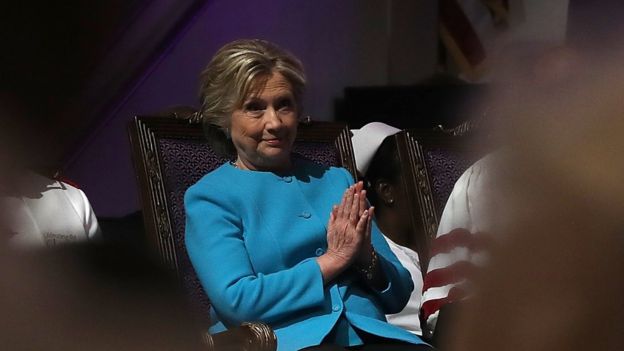 GETTY IMAGES
GETTY IMAGES
Look for early projections for Clinton in New York (29), where she is heavily favoured.
The starkly divided state of Colorado (9), which has a growing Latino population but a strong conservative streak, will be a key state to watch this hour. Historically, it's one of the most widely swinging battleground states, casting its vote for Republican George W Bush in 2004 by a higher percentage than the nation as a whole, but then doing the same thing for Democrat Barack Obama four years later.
The industrial Midwestern state of Michigan (16) could also cause an upset. Voters there haven't supported a Republican for president since 1988, but a backlash against globalisation has turned the state's heavily populated white, non-college-educated voters to Trump.
Polls also close in Texas (38), Kansas (6), Louisiana (8), North Dakota (3), South Dakota (3), Minnesota (10), Wyoming (3) and Nebraska (5). It's worth noting that Nebraska and Maine are the only two states not to allocate all their votes to the winner of the popular vote.
Keep an eye on Wisconsin (10), which hasn't gone Republican since 1984. Trump has been making a last-minute push to turn the state red.
New Mexico (5) used to be seen as a swing state but Democrats have won five of the past six presidential elections and Trump's anti-immigrant rhetoric and repeated vows to build a wall along the border should hand it to Clinton this time.
22:00 EST (03:00 GMT)
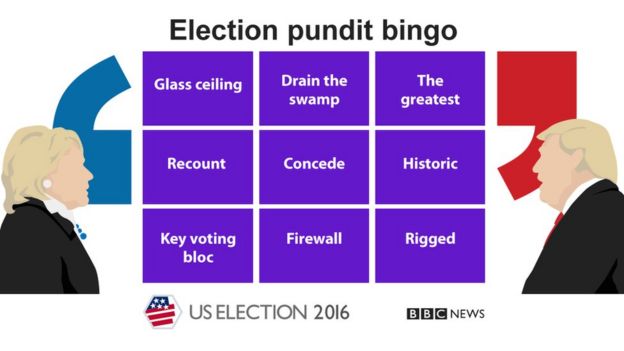
Historically Republican Nevada (6) looks like it could be a nail-biter, as early voting suggests a Hispanic surge could turn out for Clinton. It's a similar situation in Arizona (11), which has voted Republican in every election since 1952 with the exception of Bill Clinton's win in 1996.
Utah (6) is another interesting one to watch. Former CIA agent and Mormon Evan McMullin, who is running as an independent, is doing well in the polls and could be the only state to hand a loss to both Clinton and Trump, despite backing Republican candidates in the past.
Iowa (6) is a must-win for Trump, given his strength among white, non-college-educated voters, but it voted for Obama in 2008 and 2012 so it's not a done deal.
Montana (3) has been safely Republican since 1968, bar a single victory for Democrat Bill Clinton in 1992.
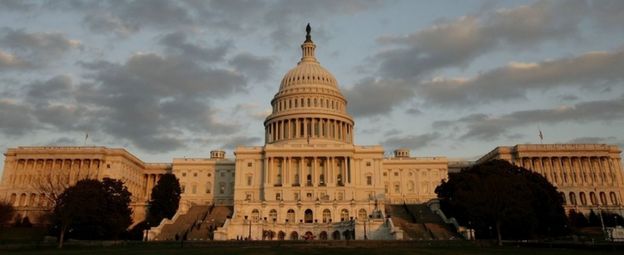 GETTY IMAGES
GETTY IMAGESHow are projections made?
The pressure is always on the main American TV networks to be the first to "call" the result of a presidential election, before all of the votes have been counted - a process that can take days.
But there is even more pressure on them to get that announcement right.
Nobody wants a repeat of the 2000 election, when the networks had to withdraw their projected result for Florida after prematurely declaring George W Bush the next president.
The networks have "decision desks", groups of statisticians who are kept away from the main news room, and whose job it is to come up with state-by-state projections.
The BBC is using projections from experts at ABC News - its US broadcast partner - for the presidential race. For the House, Senate and governor races, it will use the Associated Press news agency, which gathers voting data from state and local officials.
Many other networks use AP and Edison Research, which carries out exit polls. The BBC is not conducting its own exit poll as it would at a UK general election.
Unlike most of the US networks, the BBC will not be "calling" the result of the election. It will be reporting the projections from the ABC results team, which are made based on expert analysis before all the votes have been counted.
23:00 EST (04:00 GMT)
The polls close in the biggest electoral prize on the map, California (55), which is a Democratic stronghold, as well as Oregon (7), Washington (12), Idaho (4) andHawaii (4).
Drum roll: Depending on how the electoral college is stacking up, every media outlet under the sun could declare the next president of the US.
Tradition dictates that a concession speech will follow shortly afterwards. It was at 00:00 EST (05:00 GMT) in 2012 and 2008. However, in 2004, John Kerry didn't concede until the following day.
Given Trump's rhetoric about "rigged elections", if he doesn't win, he might demand a recount or refuse to concede. If that happens, when the US president is finally declared is anybody's game.
01:00 EST (06:00 GMT)
Poor old Alaska (3). If it's really, really tight, the state might still matter, but expect the drama to already be over.
Other things to watch
Americans are also voting for 34 of the US Senate's 100 seats and all 435 seats in the House of Representatives. Democrats need four seats to regain control of the Senate and 30 seats to regain control of the House.
Twelve governorships are also up for grabs.
20 January 2017
The president-elect won't actually become the 45th president of the United States until 20 January, which is Inauguration Day. This is explicitly laid out in the US constitution. The president-elect will place his or her hand on the bible and take the Oath of Office at noon. From then, the government is in their hands.
So is the White House. Usually, the sitting president and their spouse host the incoming First Couple for tea before the ceremony. About six hours later, the new First Family moves in.

No comments:
Post a Comment